- Home
- Lisa Appignanesi
The Memory Man Page 14
The Memory Man Read online
Page 14
He couldn’t subject himself to kneeling before atrocity. In the way Catholics kneeled before a dying tortured god. His grandfather’s ironic cackle at this further turn of the screw rang in his ear like the tolling of a distant bell. Yes, he saw it now. It was as if the worst of the war could be confronted only if it were assimilated into religion. Murder, suffering made holy, transmuted into a moral touchstone, a mantra, a measure for all horror. Yes, that was why he wouldn’t go with Amelia. He couldn’t join the worshippers, pious or mute. Religion was about belief. Folklore about superstition. History, he hoped – like the science he had always championed – was about thought, analysis. He would say this to Amelia. Explain. It was different for her.
But it was all so difficult. He shouldn’t have come here with her. Wide-eyed, expectant, she kept asking for what he couldn’t give. Not yet. Maybe never. He still couldn’t allow his mind the freedom to roam in those more threatening regions he had forced into shadow for so long. He didn’t want the self he had then been to inhabit him. It was a nasty, suspicious, brutalized self, prone to find enemies everywhere – because in those days they had indeed been everywhere. But the self had lasted longer than the war and it carried its burden of guilt with it. The guilt of still being alive when so many weren’t. A guilt that tried to wash itself clean by finding more enemies anywhere, everywhere, to struggle against. To make that deformed self a necessity. To give it a justification.
Eve in the end had quietened him, wooed him out of it, shown him that he also knew how to be gentle, how to laugh, occasionally even how to trust. Not that they had talked. She had shown him by example.
It was all so long ago now. So long since he had revisited any of that dark matter, he was half afraid that by now he might even have given birth to new monsters – like those grotesque confabulations amnesiacs come up with, asserting with quiet aplomb that they’ve been married for three years and have children from that marriage who are twenty.
As a preventative, that morning, he had forced himself to check on the holders of the name which had led him here, like a hound bred blindly to follow a single trail. There were four of them in the telephone directory, two at the same address. One of these was Aleksander. He would ask him. Yes, he would. Soon. As soon as he could come up with a plausible story about why he wanted to know. That hadn’t shaped itself for him yet.
‘Pops.’ Amelia’s voice startled him from his reverie. He had stumbled without thinking into Kazimierz’s main square, and there was Amelia waiting for him. She was sitting at an outdoor table in front of a small restaurant partly hidden from view by the ranks of parked cars. The area, he noted to himself, was still somewhat shabby, no matter what people told you about how much had been restored over the last ten years, the Spielberg effect and all that.
‘Pops, you just walked straight past us. This is the Ariel…well, one of the two. They compete, as this young man has been explaining to me.’
The young man who had startling yellow hair and one of those noses that spoke of Greek statuary or English public schools looked rather furtive as Bruno approached and hastily excused himself with a great scraping of chair legs on pavement.
‘You frightened him, Pops. You’re a scary person.’
‘That’s’ cause his intentions weren’t honourable.’
‘You could see that immediately, right?’
‘What else are fathers for?’
Amelia stretched her long legs. ‘Let me get you something. Juice. Coffee. Some lunch. Of course, it’s lunchtime. They do borscht and all kinds of herrings. Look.’
Bruno studied the menu, which reminded him of West Broadway in the old days, ordered herring in onions and sour cream with tea and borscht with dumplings for Amelia from a waiter who looked like an extra on a Hitchcock set. He could feel Amelia watching him as his lips curled clumsily round the language.
‘What else fathers are for,’ she took up his banter in a more serious vein, ‘is introducing their children to the history that made them.’
‘It’s not like that, Amelia.’
‘Because the history that made them gets passed down, willy-nilly.’
‘Nonsense.’
‘Even if you don’t talk about it, it’s there. It’s there in your silences, in your gestures, in the odd things that make you angry, like filling in forms. In your sudden starts. In the way that you used to hug me as if I might disappear down an Alice hole at any minute.’
He stared at her. Uncomfortable. Did he? More so than other parents?
‘I want to understand. You’re a mystery I want to understand. I want you to take me to Auschwitz.’
‘I told you, Amelia. I have no interest in going. I’m not a great visitor of public memorials. Nor do I want to read explanatory captions beside mountains of shoes or words on stone. All of this is hard enough as it is. I understand that for you it’s different. And you must go. Yes, you must.’
He had had to clear his throat over the mountains of shoes. As if the words wouldn’t come out. Why? Only a few hours ago he had paused in front of a shabby shop window and seen just that – a mountain of shoes, all displayed higgledy-piggledy on top of each other and making plenty the only aesthetic. The mass, not the individual. That had made him think of the killer camps, as if somewhere there might be a link. But he didn’t want to think about that. Enough emotional energy had gone into that kind of thinking all those years ago.
Amelia burst into his thoughts. ‘You’re not kidding it’s different. I may be one of the few Polish Jewish Blacks in unrecorded history, and my father’s too scared to take me to Auschwitz some fifty-five years after it closed for business.’
He studied her, decided that she was serious despite the mock-hyperbolic tone. They were quiet as the waiter deposited their plates, quiet for longer than usual as they ate.
At last he said: ‘It’s not quite the way you think, Amelia. I… No, no, that’s not right. I suspect you think there’s a trauma somewhere. A trauma that I won’t talk about. That I can’t confront. That will somehow get better if I do. If I put a narrative to emotion, even if the narrative isn’t quite right. But can you imagine the opposite? Can you imagine that one of the reasons I don’t want to go is that I’m afraid of feeling nothing? Nothing? Nothing at all? No emotion that can possibly meet the measure of those times?’
He gazed at her incomprehension. ‘Yes, that’s right. And the second reason may be that what I don’t want to confront, certainly don’t want to share with you, is something as simple, as ghastly, as banal, as self-hatred. Not guilt. Just self-hatred.’
‘You have no reason to hate yourself.’
‘I think I’m the only judge of that.’
She examined him. ‘Is this linked to why you don’t like Aleksander? Does he remind you of yourself?’
Something like panic rose up in him. He swallowed hard, scrambled for a voice. ‘What makes you think I don’t like him. I do. I do.’
‘The man doth protest too much. What do you think of his science?’
‘Why?’
‘I slept with him.’
‘I see.’ He didn’t see at all, but he blundered on. ‘Does this have anything to do with his science?’
‘Maybe. Maybe not. But it’s a way of telling you.’
‘Telling me you like him?’
‘I do.’
‘I don’t understand… It’s strange.’
He could see that the words that had dropped out of him inadvertently made her unhappy, wary. She looked as if she might bite back, be rude, the way she had done as an adolescent if he said anything even slightly critical about her boyfriends. These bumped along erratically between effete East-coast preppies and druggie ghetto youths, roadside mirrors in whom she hoped to see herself, but who never reflected her adequately.
‘His science is fine.’
She looked at him for a moment without responding. ‘Does that mean as fine as your being here? Less fine? Or more? Nobel-standard fine?’
‘I
’m not locking you out, Amelia.’ He made an effort, though his mind was racing with this other news. If Tarski was who his fears suggested, then he shouldn’t be with his daughter.
‘It’s just…this whole trip, it’s not what I expected, that’s all. Though I don’t know quite what I did expect. You see…my own history was very particular. It doesn’t quite fit into the most prevalent narratives. And there isn’t much I can show you except for buildings. They’re not what make a city. Not really. It’s the people. And the people aren’t here. When I was last in this particular square, as a child, it was teeming, noisy. Crowded and noisy with the babble of Yiddish, which I didn’t really understand. There were Jews like me, ordinary, western, business-suited, and Jews like I really didn’t know them. Exotic. They all argued and gestured and did business and tugged at their beards and haggled, and there were synagogues chock-a block at every corner and street hawkers, barrels of herring and pickles, bread stalls, horses and carts, women with headscarves or elegant feathered hats and almond-shaped eyes…and now, well now there’s this – a car park with a few half-restored buildings. A few shards of the past, like at some archaeological dig, even though it’s less than a lifetime away. And the ghosts have hardly begun to talk to me.’
‘I don’t think you’re telling the whole truth.’ She mimicked the childhood words she would throw at him and Eve when they simplified things for her. Kept the bad in the world at an adult distance.
‘You’re right.’ He heard himself sigh, and his voice had a sudden hoarseness. ‘You see, all this, the past, it was never part of the world I shared with your mother. She was a way of leaving it behind. She didn’t belong here. With her, I didn’t either. And you…well…I can’t make myself feel you’re part of this. You’re too good.’
Amelia made a funny face and squeezed his hand. ‘It’s okay, Pops,’
‘But I will take you somewhere. Yes I will. Not Auschwitz. But somewhere. I’ve just remembered. Deaths of a more ordinary kind.’
He was mumbling, talking almost to himself, in the grip of a force that was greater than him. It led him by the hand, so that he seemed to know the way. First south, then into a lane, where he vaguely thought the ramshackle youth centre might once have been a synagogue whose name escaped him, then north along a wide street where the trams clattered and east along Miodowa and under a tunnel across into the New Cemetery. The new Jewish Cemetery that was as old as the 1800’s. His grandfather had told him that. His grandfather was holding his hand. His guide.
Amelia stopped to look at the memorial to the local Holocaust dead by the entrance gate where old tombstones lined a wall, but his grandfather didn’t pause there. He took him into the depths of the graveyard: a dense green, overgrown and shadowy with patches of falling sunlight that shimmered through the tall leafy trees and raked over slabs. They grew alive with movement. In the distance a mist rose from moist vegetation, brooding over moss-covered sandstone, marble and granite. Carved and faded Hebrew inscriptions he couldn’t read indented the tombs. Sometimes German or Polish peeked out at him.
‘It’s this way.’ He heard his grandfather’s voice, but it was his own burbling in the wrong tongue to Amelia, so that he caught himself and had to translate.
They turned and twisted along paths, sometimes dark, sometimes light, little purple and yellow wild flowers spreading to their sides amidst the dense greenery, until they came to a tall marble slab between two pillar scrolls. The name ‘Torok’ engraved in large letters sprang out at them, followed by a family line inscribed in German.
‘This is my mother’s family,’ Bruno murmured.
‘Torok?’
He nodded.
‘You never told me the name before.’
Amelia read.
But she’s not here?’
‘No, she’s not here.’
‘The last person in the family to be buried here was during the First World War.’
‘That’s right. My grandparents aren’t here. No Adolf. No Sarah.’
Amelia said nothing. She picked up some pebbles from the path they had left and carefully placed them on the tomb.
‘Who told you about that?’ he asked.
‘Stones. So the dead don’t leave their tombs to haunt us. And wait peacefully for the Second Coming. I’m not as much of a stranger as you choose to think.’
‘Your great-grandmother would have been proud of you. She was full of such lore. Her husband didn’t have much patience for it.’
‘Adolf?’
He nodded.
‘You never talk about the other side of the family. Your father’s side. The Austrian side.’
‘Moravian, in fact. Another lost country. I didn’t know them. My father, or so the story went, fell out with them. Over politics, I suspect. Or maybe it was religion. He was an adamant atheist. All before my time. So I have no idea what happened to them. They may even have died before the war. He was a good deal older than my mother, though I’ve only just thought about that now.’
They walked slowly side by side, pausing to look at the occasional tomb. She was waiting for him to say more. He didn’t quite know where to begin. He had never thought he would come here again. Not this city, nor this cemetery; and as he stole a glance at his daughter, he wondered again what had driven him. Was it the presage to his own old age, as all the memory commentators said, a move into the past because the present had become less distinct? The blood wasn’t getting through to his frontal lobes. They were shrinking. He needed some of his own as yet untested medicine. Had he come for the stimulus of recognition since pure recall no longer worked as well as it might?
Trite thoughts, he chastised himself. Another way of not talking properly to Amelia.
‘This place was vandalized by the Nazis, I read somewhere. They used the tombs as paving stones for the road to the camp at Plaszow. In November 1942.’
He nodded, pleased that she had made an effort with the history he wouldn’t speak.
‘I’m glad they left the Toroks.’
‘Left them something,’ he heard himself muttering, as if some of that old anger was still intact.
She thrust him a curious glance then stopped abruptly.
‘Look, Pops.’
She was pointing to a tall, narrow, white tombstone that looked more recent than its neighbours and as if it had been pressed out of concrete. It had something like a slate attached to its front. A list of names appeared on it. Amongst them was that of Adolf Torok.
‘What does it say?’ She gripped his hand, a small whispering girl.
He didn’t answer immediately. He read down the list over and over. ‘Disappeared in the Nazi terror’ the inscription at the top noted. None of the names seemed to stand in any relation to each other, except for that. Disappeared. A euphemism for killed in a manner unknown – in the camps, in a street raid, in a random shooting. Death was inventive in wartime. Above Adolf Torok’s name was the epitaph – ‘he helped many’. Below, the inscription noted that he had died at the age of sixty-eight. Younger than Bruno was now.
Bruno gazed at the stone and then into the distance and back again. A shroud obscured the light. The graves had lost their outlines and seemed to be moving in and out of the gloom like square-cut figures on a vast receding chessboard. Forward, back, sideways, lifted by invisible fingers and thrust down again willy-nilly, vertiginously, without rule or reason. He held on to Amelia’s shoulder for balance.
Her voice came from far away, blurring as it moved through gloom. ‘Do you think it’s him?’
He nodded. ‘Could be. It says he died, or rather disappeared, towards the end of 1942, which is probably right.’
‘But we don’t know how.’
‘They didn’t know how.’
Stumbling, Bruno explained that this tombstone had been the gift of someone who had survived and was remembering friends. His grandfather had helped him or her, it seemed, others too. Bruno knew that was true.
He wanted to sit down at the edge of
the tomb and put his face in his hands and weep. Weep as he might have done as a small boy, before everything had gone wrong. Before he had grown a thick carapace that didn’t know about tears. Before those deaths.
‘There’s somewhere else I’d like to go. I’d like to take you,’ he said at last. ‘We’ll hire a car. Tomorrow. Or the next day.’
The dead were murmuring to him, talking. He hadn’t visited them for a very long time.
Past Historic
10
They had ended up in Aleksander’s car, which was bigger and more comfortable than hers. That was just as well, Irena thought, since the Fiat wasn’t really up to long journeys anymore. Not that the Professor had told her quite how long this one was going to be. Maybe he didn’t know himself. The turn-off he had pointed to just past Tarnow and then so abruptly changed his mind about required a screech of brakes and a presence of mind neither her car nor she was up to. The Professor’s hippocampus was evidently in decline. Wasn’t that what he had told her about her mother’s inability to find her way anymore – the disappearance of the internal map? Presaging the disappearance of the terrain it charted probably…
She was pretty good on the hippocampus now, and knew a little about the amygdala too, that almond-shaped bit deep in the brain with its lateral nucleus that controlled what they called emotional conditioning – or really whatever it was one remembered best. The bits of memory that came with strong emotion. Not necessarily utterly accurate, mind, and often narrow in focus, the Professor had warned her, but intense and image-based – the source of those images that recur and recur. The scenes that form traumatic memory. She wondered if the break-up scene with Anthony qualified. She could still see him altogether perfectly, like in a snapshot, fixed in time forever with his sorrowful face on, that pretend sorrowful face that was supposed to bring out the pity in her so that she wouldn’t mind, wouldn’t want him to be hurt, whereas in fact he was busy stomping all over her.

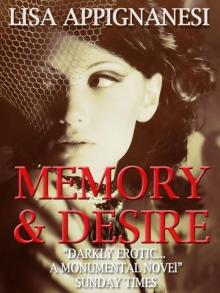 Memory and Desire
Memory and Desire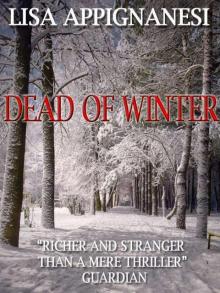 The Dead of Winter
The Dead of Winter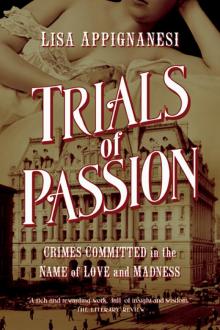 Trials of Passion
Trials of Passion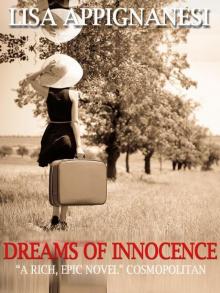 Dreams of Innocence
Dreams of Innocence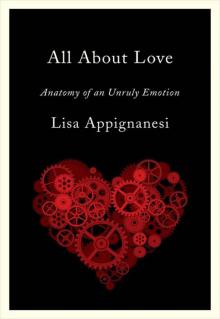 All About Love: Anatomy of an Unruly Emotion
All About Love: Anatomy of an Unruly Emotion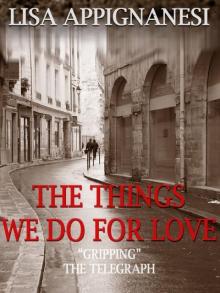 The Things We Do For Love
The Things We Do For Love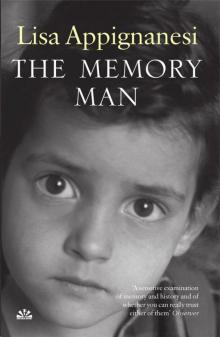 The Memory Man
The Memory Man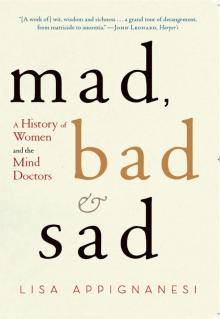 Mad, Bad, and Sad: A History of Women and the Mind Doctors
Mad, Bad, and Sad: A History of Women and the Mind Doctors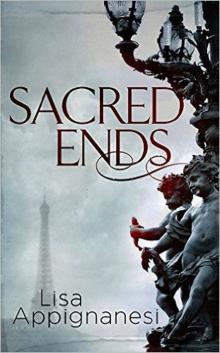 Sacred Ends
Sacred Ends Paris Requiem
Paris Requiem Sanctuary
Sanctuary A Good Woman
A Good Woman